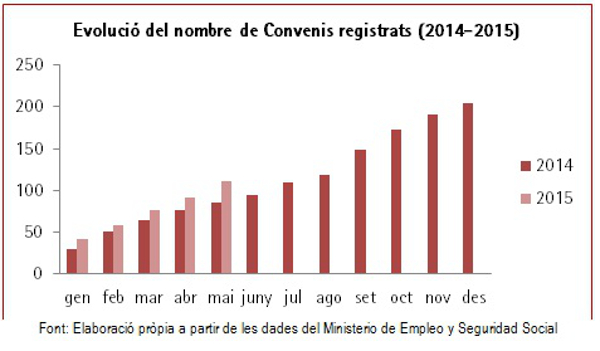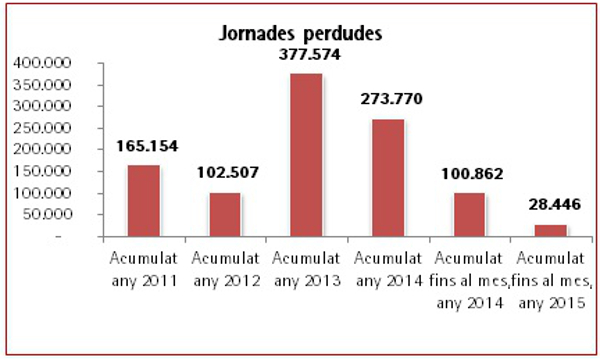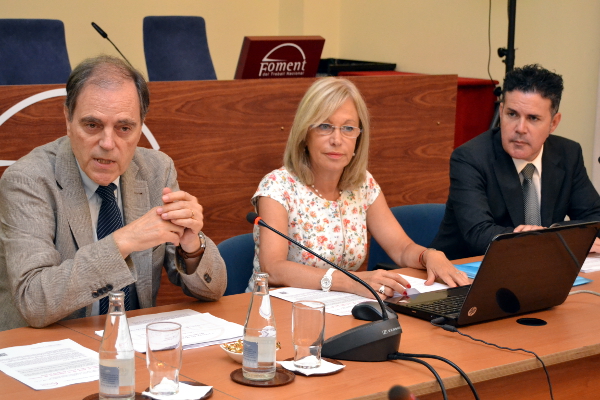- In Catalonia, from the beginning of the year, the number of labour force adjustment plans has significantly reduced: -47.47% on expiry plans, -57.76 on suspension of contracts and -55.23% on plans on reduction of the working hours
- The average wage variation in all Agreements has been of 0.86%.
- On a year-to-year variation basis, there has been a decrease of 92% in lost working days and hours because of strikes.
The negotiation of Collective Agreements increased on the first 5 months of 2015 in Catalonia, comparing to the same period in 2014. Despite the negative forecast that emerged from the publication of the Labour Reform, until 30 May 2015, 111 Collective Agreements were signed, linking 279,171 workers and 39,680 companies, 18.18% more than in 2014. The data has been collected and analysed by Foment del Treball on its first quarterly Report on the Labour Market and Collective Negotiation in Catalonia. The Report was presented this Monday, 6 July, by the secretary general of Foment, Joan Pujol; the president of the Labour and HR Commission of Foment, María Ángeles Tejada; and the director of Labour Relations and Social Affairs of Foment; Javier Ibars.
From those 111 Collective Agreements, 83 are company Agreements (74.77%) affecting 10,909 workers, and 28 are Agreements superior to company-level (25.23%), affecting 268,262 workers.
The average wage variation in all Agreements has been of 0.86%, reaching 0.91% in company Agreements and 0.86% in Agreements superior to company-level. Regarding agreed yearly working hours, average hours are 1,759.60, being 1,773.76 hours in company Agreements and 1,759.03 hours in Agreements superior to company-level.
On a year-to-year variation basis, comparing May 2014 and May 2015, we observe that this year 25 more Agreements have been signed (18.18%), the wage variation is of 0.10% more (from 0.76% agreed in 2014 to 0.86% agreed in 2015), and working day has increased 4.18%, from 1,689 hours from January to May 2014 (1,733 in all year 2014) to 1,759.60 in the same period of 2015.

Regarding labour force adjustment plans (ERE, the abbreviation in Spanish), data from the Observatori d’Empresa i Ocupació analysed by this report shows that from January to May 2015 372 files were resolved, affecting 4,035 workers in total, 55.30% less when compared to the same period in 2014 (836 ERE). From those 372 labour force adjustment plans in 2015, 52 of them were expiry plans (13.98%) –affecting 1.238 workers–, 166 were on suspension of contracts (44.62%) –affecting 2.009 workers–, and 154 were on reduction of the working hours (41.40%) –affecting 788 workers–.

Regarding labour disputes, on a year-to-year basis there was a decrease of 92% on lost working days and hours on strikes, and a reduction of 72% of the participant workers. Between January and March, 31 strikes took place in Catalonia, 11% less than in the same period of 2014. That meant a total of 26,574 lost hours until the end of March 2015.
Positive global trend for the Labour Market: need of more reforms
The updated data corresponding to the various areas with implications on the Labour Market, as well as the latest trends, are clearly positive and reaffirm the scenario of economic recovery and job creation. On a national level, the not-seasonal unemployment rate decreased continuously from May 2013 –with the exception of July 2014–, accumulating 26 months of fall. On the last 12 months, registered unemployment fell in 329.397 people, with a year-to-year reduction rate of 7.40%.
In Catalonia, the number of unemployed decreased in 20,952 people during this June. On a year-to-year basis, the unemployment fell in 59,267 people comparing to June 2014, accumulating one more month of decrease of unemployment, which is taking place since July 2013. This June, Catalonia was the autonomous community with the greatest fall in absolute terms. The year-to-year unemployment rate decrease in Catalonia is of 10.39%.
On a national level, taking into account information regarding Social Security affiliation corresponding to June, 35,085 people were added to it (0.20%), and the number of members was 17,256,395. On the other side, on a year-to-year basis, the increase of affiliation is of 571,400 people (3.42%), clearly overtaking the numbers of June 2014, 291,139 (1.78%).
In Catalonia, the number of affiliated to Social Security was of 3,083,289 in June, which means 27,363 affiliated more comparing to May 2015 (0.90%), and 107.354 more comparing to the same month of 2014 (3.61%).
However, the analysed data makes evident for Foment the need to introduce a series of reforms to consolidate the economic and employment recovery and modernize our labour relations. In that sense, since the entry into force of the Labour Reform 3 years ago, there have been several judiciary pronouncements interpreting, putting in context and, in some cases, contradicting some of the matters introduced by the Law 3/2012. This situation created legal insecurity and uncertainty when making decisions on company management in matters such as ERE, suspension of Agreements, substantial modification of working conditions, calculation of severance pays, etc.
Although the Reform substantially improved some aspects that make the flexibility mechanisms in labour relations easier, enabled adaptation of the human resources and internal structures of companies to their needs, and modernized the contents of collective negotiation; some aspects of it should be made clear in order to prevent legal insecurity.
Now the main goal is to improve the aspects that need clarification to provide the labour regulation with the maximum legal security and deeper the pending reforms on modernization and easing of our labour relations, in order to favour business competitiveness.








Comments are closed.